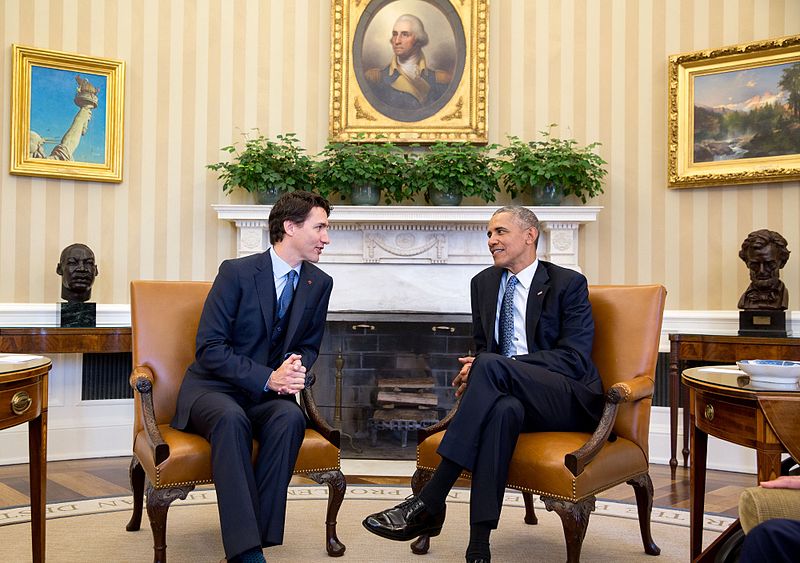In March, 2016, President Barack Obama and Prime Minster Justin Trudeau announced a commitment to a partnership in pursuing economic prosperity, embracing opportunities and confronting challenges in the Arctic region. This commitment is driven by the ambition to continue to foster environmental protection, economic development, and Arctic leadership. Consistent with the statement, on December 20, 2016, the leaders signed a joint statement titled the United States-Canada Joint Arctic Leaders’ Statement. The agreement pledges a US-Canada partnership with regards to opportunities and challenges in the Arctic, respect for Indigenous rights and a science-based approach to leadership. It also serves as a symbol of US-Canada partnership, cooperation in the region, a shared vision for the future of Arctic stability, and the resolve that both countries must play a key role in the low carbon global economy.
The Statement centres around four major provisions: a science-based approach to oil and gas; a commitment to supporting strong Arctic communities; finding ways to establish low-impact shipping corridors; and science-based management of Arctic fisheries. In its first provision, the Statement places great importance on ensuring that commercial activities are carried out with respect to the highest standards of safety and environmental protection. With this in mind, the US has designated the majority of US waters in the Chukchi and Beaufort Seas off limits to offshore oil and gas leasing. In turn, Canada designated all Arctic Canadian waters as off-limits to offshore oil and gas licensing, pledging to review these restrictions every five years. This is consistent with the interests of Indigenous, Alaska Native and other local communities, as well as large environmental groups such as Greenpeace. The Statement also pledges a recommitment to strengthening partnership with Arctic communities.
The interests of Native members of the Arctic community were placed at a high level of priority in the drafting of the Statement. In response to the requests from the Alaska Native communities, Obama took measures to protect the resources of over eighty tribes by creating the Northern Bering Sea Climate Resilience Area. In turn, Trudeau has made a promise to co-develop a new Arctic Policy Framework with the Northerners, Territorial and Provincial Governments, and First Nations, Inuit and Metis People. In this new framework, the areas of priority are to be identified by the Minister of Indigenous and Northern Affairs’ Special Representative. These stipulations are a significant step in ensuring that the interests of the Native communities are sufficiently represented in Arctic policy-making.
The Joint Arctic Leaders’ Statement is welcomed by several environmental groups and Arctic communities, who see it as a beacon of hope for long-term environmental protection. The ban on offshore oil and gas licensing has not been taken seriously by Canadian industries, who dismissed the provision as weak and trivial. Experts have expressed concern that there are currently little to no drilling plans in the region, making the ban of little practical consequence. Premiers of all three Northern territories regarded the agreement with apprehension and expressed severe concern at not having been consulted on the agreement’s stipulations. In the US, the Republican Party met the American closure on offshore oil and gas leasing with fierce criticism.
Some have come to view the joint statement as Obama’s final act of entrenching Arctic climate change and environmental sustainability into federal law. President-elect Donald Trump has made it very clear that he intends to overturn Obama’s climate change and environmental protection policies, and the ban on offshore drilling will likely be one of them. Trump has become known for a lack of interest in environmental protection and climate change, and shows great interest in the exploitation of Arctic resources. Though Trump has not yet made a clear plan regarding his Arctic policies, he has vigorously opposed policies regarding climate change throughout his campaign, and his decision to overturn the ban on offshore drilling would come as no surprise. Environmental groups claim that Trump would need to have the approval of the courts to reverse the ban, but the American Petroleum Institute oil industry said that it is likely that Trump could use a presidential memorandum to do so. Still, the Joint Arctic Leader’s Statement has been met with widespread support and makes a powerful statement in support of the importance of environmental conservation. Reversing it would require the Republican Party to provide a credible argument on how its harms outweigh its benefits.
The Joint Arctic Leaders’ Statement is a significant step towards increased cooperation and environmental protection in the Arctic region, and may be a pivotal step in the future of Arctic sustainability.
Photo: Bilateral meeting of Barack Obama and Justin Trudeau (2016), by Pete Souza via Wikimedia Commons. Licensed under CC BY 2.0.
Disclaimer: Any views or opinions expressed in articles are solely those of the authors and do not necessarily represent the views of the NATO Association of Canada.




